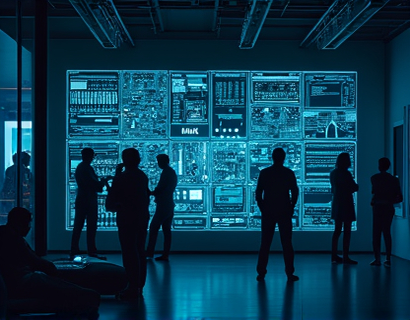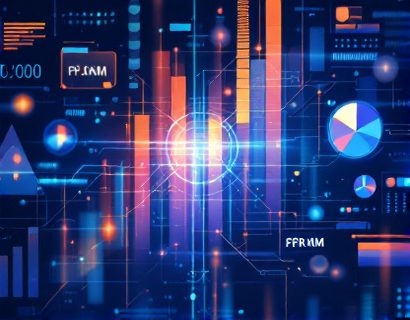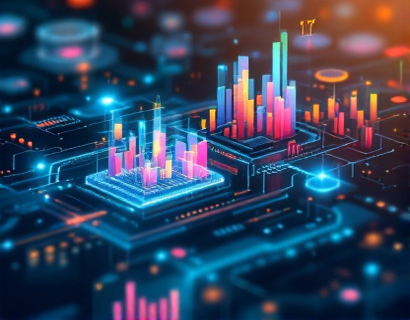Harnessing the Synergy of Crypto and AI: Transforming Digital Engagement
The intersection of blockchain technology and artificial intelligence (AI) is giving rise to a new era of digital engagement, particularly within the realm of app innovation and ecosystem development. This synergy is not just a technological curiosity but a powerful force reshaping how users interact with digital services, driving unprecedented growth and enhancing user experiences. This article explores the transformative impact of combining blockchain and AI, focusing on how these advanced technologies are revolutionizing the tech ecosystem and opening new avenues for tech enthusiasts and early adopters.
Understanding the Basics: Blockchain and AI
To fully appreciate the potential of integrating blockchain and AI, it's essential to understand the fundamental principles of each technology. Blockchain, at its core, is a decentralized ledger that records transactions across multiple computers in a way that ensures security, transparency, and immutability. This technology underpins cryptocurrencies like Bitcoin and Ethereum, but its applications extend far beyond digital currencies.
Artificial intelligence, on the other hand, involves the simulation of human intelligence processes by machines, particularly computer systems. These processes include learning (the acquisition of information and rules for using it), reasoning (using rules to reach approximate or definite conclusions), and self-correction. AI can operate through various subsets, including machine learning, natural language processing, and computer vision.
The combination of blockchain and AI leverages the strengths of both technologies. Blockchain provides a secure and transparent framework for data integrity, while AI enhances the processing and analysis of data, enabling smarter and more autonomous systems. This integration is particularly potent in the context of digital engagement, where user interaction and data management are critical.
Enhancing User Engagement through Blockchain and AI
One of the most significant impacts of combining blockchain and AI is the enhancement of user engagement. Traditional digital platforms often struggle with user retention and engagement, partly due to issues like data privacy, trust, and personalized experiences. The integration of blockchain and AI addresses these challenges by creating more secure, transparent, and personalized interactions.
Blockchain ensures that user data is securely stored and managed, giving users greater control over their information. Smart contracts, self-executing contracts with the terms directly written into code, can automate and enforce agreements, reducing the need for intermediaries and increasing trust. AI, meanwhile, can analyze vast amounts of user data to deliver highly personalized experiences, recommendations, and content, keeping users engaged and coming back for more.
For instance, in the realm of gaming, blockchain and AI can create decentralized gaming platforms where users own their in-game assets as NFTs (non-fungible tokens). AI can enhance gameplay by creating dynamic, adaptive environments and NPCs (non-player characters) that learn from player behavior, providing a more immersive and engaging experience.
Driving Growth in the Tech Ecosystem
The synergy of blockchain and AI is not only transforming user engagement but also driving growth across the tech ecosystem. By fostering innovation and efficiency, these technologies are opening new markets and creating opportunities for businesses and developers alike.
Decentralized applications (dApps) are a prime example of this growth. dApps leverage blockchain to operate without central authorities, offering developers a new platform to build innovative services. AI can enhance these applications by providing intelligent features such as predictive analytics, natural language interfaces, and automated decision-making. This combination can lead to the development of more robust, scalable, and user-friendly applications.
Moreover, the integration of blockchain and AI can revolutionize data management and monetization. Blockchain-based data marketplaces allow users to sell their data securely and transparently, while AI can process and analyze this data to generate valuable insights. This creates a win-win scenario where users are compensated for their data, and businesses gain access to high-quality, actionable information.
Case Studies: Real-World Applications
Several real-world projects demonstrate the potential of combining blockchain and AI to enhance digital engagement and drive growth.
One notable example is a decentralized social media platform that uses blockchain to ensure user data privacy and ownership. AI algorithms analyze user interactions to curate personalized feeds and recommend content, similar to traditional platforms but with a focus on user control and transparency. This approach not only enhances user engagement but also builds trust and loyalty among users.
Another case is in the financial sector, where blockchain and AI are being used to create more efficient and secure trading platforms. Smart contracts can automate trading processes, while AI can analyze market trends and provide real-time insights, enabling traders to make more informed decisions. This combination reduces fraud, lowers transaction costs, and improves overall market efficiency.
Challenges and Considerations
While the potential of integrating blockchain and AI is vast, there are several challenges and considerations that need to be addressed. One of the primary challenges is the technical complexity involved in developing and maintaining these systems. Both blockchain and AI require specialized knowledge, and combining them necessitates a multidisciplinary approach.
Scalability is another significant issue. Blockchain networks, particularly those using proof-of-work consensus mechanisms, can face performance bottlenecks. AI models, especially deep learning algorithms, require substantial computational resources, which can strain existing infrastructure. Innovations in blockchain scalability solutions and more efficient AI algorithms are crucial to overcoming these challenges.
Regulatory uncertainty is another factor to consider. The intersection of blockchain and AI operates in a relatively uncharted legal landscape, with varying regulations across different jurisdictions. Ensuring compliance and navigating the regulatory environment is essential for the successful deployment of these technologies.
Future Prospects: The Road Ahead
The future of blockchain and AI integration holds immense promise. As technology continues to evolve, we can expect more sophisticated and seamless combinations of these tools. Advancements in quantum computing, for instance, could revolutionize both blockchain and AI, enabling faster and more secure data processing.
In the context of digital engagement, the next generation of apps and services will likely be characterized by highly personalized, secure, and autonomous interactions. Users will have greater control over their data, and businesses will benefit from more accurate and actionable insights. The potential for innovation is vast, from decentralized healthcare platforms that use AI for diagnostics to smart city solutions that leverage blockchain for transparent governance.
For tech enthusiasts and early adopters, this is an exciting time. The convergence of blockchain and AI is not just a technological trend but a fundamental shift in how we interact with digital systems. By staying informed and embracing these advancements, individuals can position themselves at the forefront of this new digital revolution.
In conclusion, the integration of blockchain and AI is poised to transform digital engagement, driving growth and innovation across the tech ecosystem. By enhancing user experiences, fostering trust, and enabling new business models, these technologies are reshaping the future of digital interactions. As we continue to explore and harness their potential, the possibilities are truly limitless.










































